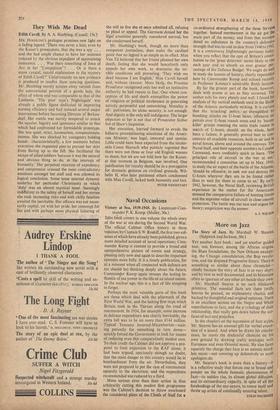They Wish Me Dead
(Edith Cavell. By A. A. Hoehling. (Cassell, 15s.)
MR. HOEHLING'S prologue promises new light on a fading legend. 'There was never a hint, even by the Kaiser's prosecutors, that she was a spy . . and she had ample chance to have her sentence reduced by the obvious expedient of maintaining innocence. . . . Was there something of Joan of Arc in her "Compulsion"? . . . Or is there a more cynical, untold explanation to the mystery of Edith Cavell?' Unfortunately no new ,evidence is produced to resolve these enticing questions. Mr. Hoehling merely scrapes away varnish from the conventional portrait 'of a gentle lady, the effect of whose end was comparable to that of the Lusitania. 'The poor man's Nightingale' was already a public figure dedicated to improving nursing efficiency and had induced several major innovations before becoming Director of Berkan- dael. Her mettle was sternly tempered to attack the squalor, bigotry and ignorance similar to that which had confronted her formidable prototype. She was quiet, strict, .humourless, compassionate, intense. She was shocked, by youngsters, holding hands : characteristically, a few moments before execution she requested pins: to prevent her skirt from flaring up as she fell. She facilitated the escape of allied soldiers 'because it was the natural and obvious 'thing to , do, in the interests of humanity.' Her perpetual rejection of expediency and compromise aroused the most contradictory emotions amongst her staff and was allowed its logical conclusion. Some tense internal dynamic underlay her particular Christianity in which `duty' was an almost mystical tenet. Seemingly indifferent to the safety of •herself and her nurses she took increasing risks and with chilly fatalism awaited the inevitable. Her offence was not neces- sarily capital, yet with her pride, her contempt for lies and with perhaps some physical faltering of
the will to live she at once admitted all, refusing to plead or appeal. The Germans denied her the legal amenities generally considered normal, but she condemned herself.
Mr. Hoehling's book, though no more than competent journalism, does make the cardinal point that no legend is as simple as its effect. Miss Van Til believed that her friend planned her own death, feeling that she would henceforth only impede her own work, to dramatise the ter- rible conditions still prevailing. 'They wish me dead because I am English,' Miss Cavell herself said, without rancour. More likely, the Prussian Prosecutor recognised only too well an instinctive authority he had reason to fear. One whose con- ception of life and death exemplifies the power of religious or 'political intolerance in generating activity purposeful and unremitting. Morality is all: patriotism, let alone security, is not enough. And dignity is the only self-indulgence. The larger objection to her is not that of Prosecutor Stober but of Shaw's Inquisitor.
Her execution, hurried forward to evade the hitherto procrastinating attentions of the Ameri- can Minister, was legal, immoral and unwise. Little could have been expected from the intoler- able Count Harrach who publicly regretted that there were not three or four old English women to shoot, but we are not told how far the Kaiser, at that moment in Belgium, was involved. One justification for royalty should be in a prerogative for dramatic gestures on civilised grounds. Wil- helm II, who later pardoned others condemned with Miss Cavell, lacked both humanity and tact.
PETER VANSITTART


































 Previous page
Previous page